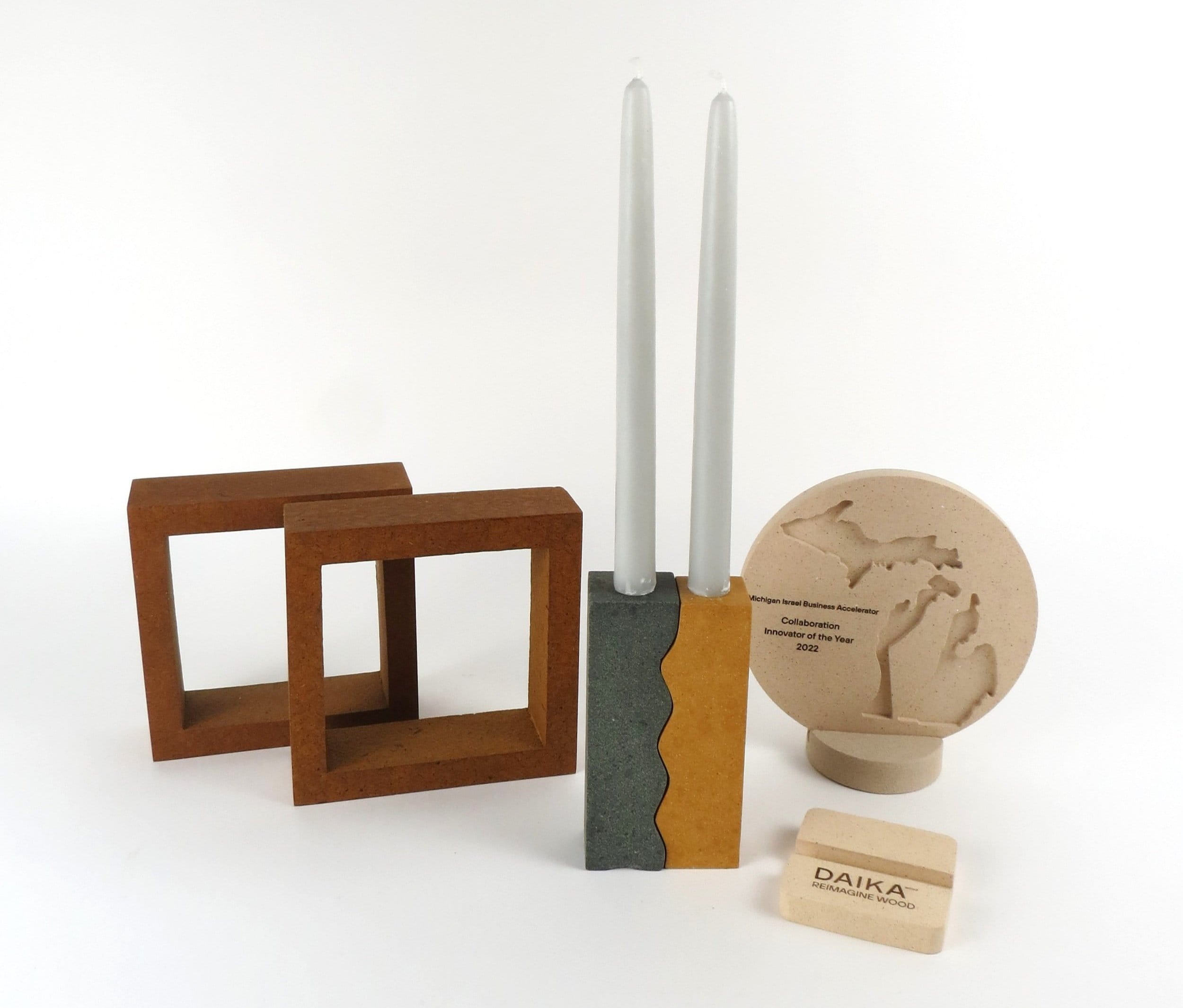The web Browser you are currently using is unsupported, and some features of this site may not work as intended. Please update to a modern browser such as Chrome, Firefox or Edge to experience all features Michigan.gov has to offer.
Collaboration turns unusable donations into feedstock for manufacturing new goods
August 27, 2024
Today's story is part of a series from NextCycle Michigan that MI Environment runs periodically to highlight the program's effort to attract end markets for recyclable materials through new companies and new jobs in Michigan, leveraging state dollars with private investment. NextCycle Michigan is an EGLE initiative.

Products made from recycled wood materials.
The Challenge
Goodwill Industries International has been a leading force in the resale of used merchandise such as clothing, housewares, furniture, and books for over a century. Goodwill’s mission is, “to enhance the dignity and quality of life of individuals and families by strengthening communities, eliminating barriers to opportunity, and helping people in need reach their full potential through learning and the power of work." Its thrift stores and other businesses serve the mission by simultaneously providing entry- and mid-level jobs and partially funding the organization.
As governments and businesses work to increase circularity and social equity, Goodwill's experience and infrastructure put it in a key position to help activate this growing movement. While Goodwill is able to utilize donations through resale and recycling, inevitably some items entrusted to Goodwill are unsaleable. These items often find their way to local landfills or incineration.
Goodwill Industries of West Michigan (GIWM) is facing this problem head-on by developing recycling markets within their organization for the three highest-volume materials they have been sending to landfills: plastic, glass, and wood. Wood is a particular challenge as much of it is furniture composed of wood combined with plastics and adhesives like particleboard, pressboard, and laminates.
The Solution
Nick Carlson, business development director at GIWM, has been an advisor to NextCycle Michigan since its inception. In a conversation with two other program leaders, Dan Radomski of Centrepolis Accelerator and Matt Naud of Resource Recycling Systems (RRS), he mentioned that plastic, glass, and wood make up the majority of the material in GIWM’s waste stream. While he described emerging plans for plastic and glass items, wood items appeared to be left without a solution. And then, the NextCycle Michigan network delivered for GIWM. Carlson explains, “When I mentioned the wood, Dan turned to Matt and said, ‘What about Daika?’”
Daika Ltd. is a start-up company in Israel, developing an innovative technology that can turn virtually any wood waste into a new raw material for manufacturing, DAIKA WOOD. This new material is composed of waste wood and Daika’s proprietary 100% natural organic additives using a low-energy, zero-waste process.
After connecting GIWM and Daika through the NextCycle Michigan program, the Michigan Department of Environment, Great Lakes and Energy (EGLE) supplied a $10,000 grant to support exploration of the potential partnership. GIWM used the grant to research capital costs, partnership structure, deal points, and sources of grant funding to capitalize equipment.
The Results
As 2023 turned to 2024, Daika and GIWM signed a memorandum of understanding.
“The partnership with Goodwill Industries of West Michigan is of great importance to Daika. It enables us to enter the US market with a great company, make our technology accessible to diverse customers, and together address the wood-waste challenges,” said Shlomo Amir, Daika’s CEO
GIWM is on track to begin wood-recycling operations with the Daika-licensed process and technology in 2025. The facility, located in Muskegon, will initially be supplied with waste wood material from GIWM’s own operations, but it will have the capacity to accept wood from other businesses as well. GIWM plans to manufacture wood items for various other businesses including the potential to sell items in their stores. Carlson cited examples including ping-pong paddles, engraved awards, and items for West Michigan’s office furniture manufacturers.
Carlson envisions other Goodwill regions across North America having their own Daika-process facilities, creating a hyper-local circular economy for wood items that are otherwise bound for a landfill or incinerator.
Carlson sees that as the 10-year plan, saying, “We have to get ours going first—make sure we have products to make and that the products are selling. But I have several Goodwills that have expressed interest in getting the system once we trial it!”